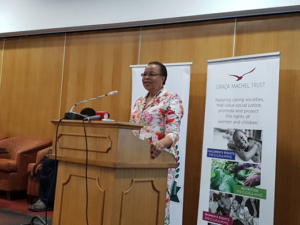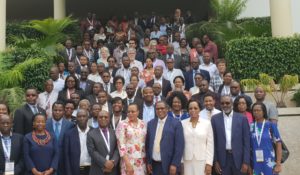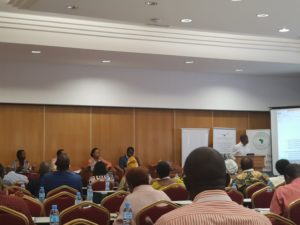
The 2018 High Level Policy Dialogue on Transforming Africa’s Agriculture was held from the 20th to the 22nd of November in Maputo, Mozambique. The Dialogue was a collaborative effort of four organizations – the Mandela Institute or Development Studies (MINDS), the Food, Agriculture and Policy Analysis Network (FANRPAN), the Graça Machel Trust (GMT), and Center for Coordination of Agricultural Research and Development for Southern Africa (CCARDESA) together with local, regional, and global partners. The dialogue made recomendations aimed at ensuring a food and nutrition secure African continent based on active and meaningful engagement of women and youth along agriculture value chains.

The delegates identified seven key recommendations that can transform African agriculture. These include that every stakeholder plays a role in transforming agriculture, and not leave this to donors or civil society alone. They emphasised the need to develop robust solutions to address the prevailing challenge of climate change, as well as increasing production and productivity of smallholder farmers to meet the increasing demand for food whilst also addressing the challenges they face in accessing markets. The need to identify ways of getting more women and the youth participating along agriculture value chains was identified as critical, as was use of technology as smallholder African agriculture continues to largely depend on archaic rudimentary implements like the hand hoe.
Speaking at the closing of the Regional Dialogue, Mrs. Graça Machel said there is need to create opportunities from the challenges facing African smallholder agriculture. “Let’s define the things we need to transform, and who is responsible for this transformation, what they need to do, as well as ask how we should hold each other accountable.”

In response to the challenge, the FANRPAN, MINDS, GMT and CCARDESA, together with their collaborating partners, agreed to develop and implement a joint legacy project aimed at fundamentally transforming the lives of women, children and youth in two districts in Mozambique with high rates of stunting.
A total of 192 delegates from 21 countries attended the Policy Dialogue. The delegates represented governments; intergovernmental organisations; civil society; research institutions; private sector; farmer organisations; and donors. Of those represented, 21% were youth and 40% women. The 2018 Regional Policy Dialogue was anchored several sub themes, including: nutrition and food systems; climate resilient agriculture; policies to transform African agriculture; and women and youth agripreneurship.










 The Trust supports and mobilises civil society networks on issues of ending child marriage, ending violence against children, ending female genital mutilation and promoting children’s rights, to carry out advocacy and action across Africa. Special focus is placed on Malawi, Mozambique, Tanzania and Zambia where child marriage continues to be a problem largely driven by poverty, gender inequality, harmful traditional practices, conflict, low levels of literacy, limited opportunities for girls and weak or non-existent protective and preventive legal frameworks.
The Trust supports and mobilises civil society networks on issues of ending child marriage, ending violence against children, ending female genital mutilation and promoting children’s rights, to carry out advocacy and action across Africa. Special focus is placed on Malawi, Mozambique, Tanzania and Zambia where child marriage continues to be a problem largely driven by poverty, gender inequality, harmful traditional practices, conflict, low levels of literacy, limited opportunities for girls and weak or non-existent protective and preventive legal frameworks.




 Education is a fundamental right for all children, which is also a vehicle for social, economic and political transformation in communities, countries and the African continent at large. Recent studies indicate a lack of progress in some of the critical commitments aimed at improving education quality, access, retention and achievement, particularly for girls. In most African countries, girls may face barriers to learning, especially when they reach post-primary levels of education. By implementing multi-dimensional approaches to education which includes core education, personal development, life skills and economic competencies, the Trust partners with funding partners, governments, civil societies and the private sector to improve education access.
Education is a fundamental right for all children, which is also a vehicle for social, economic and political transformation in communities, countries and the African continent at large. Recent studies indicate a lack of progress in some of the critical commitments aimed at improving education quality, access, retention and achievement, particularly for girls. In most African countries, girls may face barriers to learning, especially when they reach post-primary levels of education. By implementing multi-dimensional approaches to education which includes core education, personal development, life skills and economic competencies, the Trust partners with funding partners, governments, civil societies and the private sector to improve education access.

 The Nutrition and Reproductive, Maternal, New-born, Child and Adolescent Health and Nutrition, (RMNCAH+N) of the Children’s Rights and Development Programme aims at promoting the Global Strategy for women, children and adolescents’ health within the Sustainable Development Goals (SDG) agenda. The strategy emphasises on the importance of effective country leadership as a common factor across countries making progress in improving the health of women, children and adolescents.
The Nutrition and Reproductive, Maternal, New-born, Child and Adolescent Health and Nutrition, (RMNCAH+N) of the Children’s Rights and Development Programme aims at promoting the Global Strategy for women, children and adolescents’ health within the Sustainable Development Goals (SDG) agenda. The strategy emphasises on the importance of effective country leadership as a common factor across countries making progress in improving the health of women, children and adolescents. Through its Early Childhood Development (ECD) plan, The Trust will seek to put into action the new science and evidence Report that was presented by Lancet Series on Good and early development – the right of every child. This will be achieved by mobilising like-minded partners to contribute in the new science and evidence to reach all young children with ECD. The Trust’s goal is to be a catalyst for doing things differently, in particular, to rid fragmentation and lack of coordination across ECD sectors. In response to evidence showing the importance of political will in turning the tide against the current poor access and quality of ECD. Even before conception, starting with a mother’s health and social economic conditions, the early years of a child’s life form a fundamental foundation that determines whether a child will survive and thrive optimally.
Through its Early Childhood Development (ECD) plan, The Trust will seek to put into action the new science and evidence Report that was presented by Lancet Series on Good and early development – the right of every child. This will be achieved by mobilising like-minded partners to contribute in the new science and evidence to reach all young children with ECD. The Trust’s goal is to be a catalyst for doing things differently, in particular, to rid fragmentation and lack of coordination across ECD sectors. In response to evidence showing the importance of political will in turning the tide against the current poor access and quality of ECD. Even before conception, starting with a mother’s health and social economic conditions, the early years of a child’s life form a fundamental foundation that determines whether a child will survive and thrive optimally.